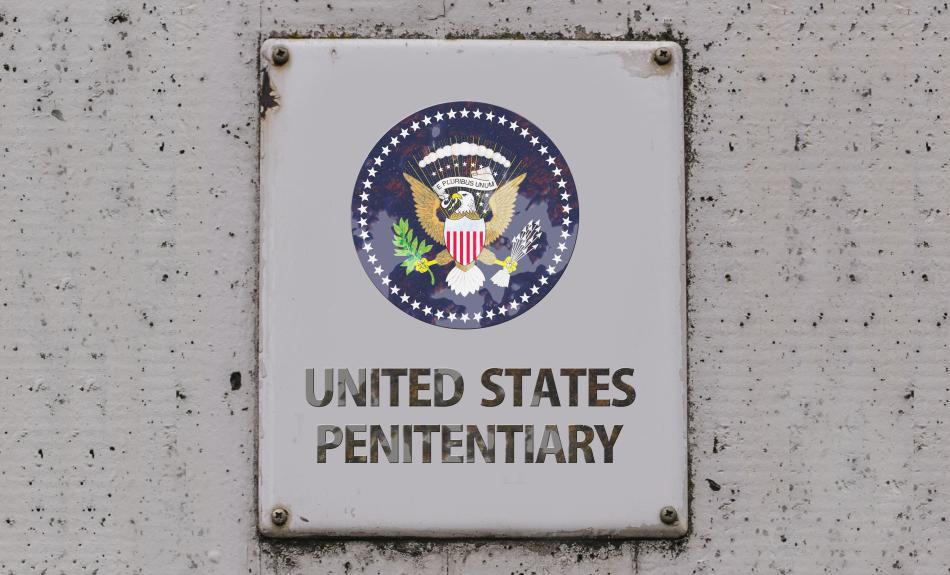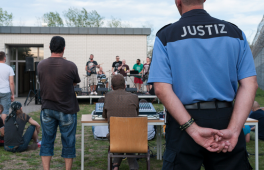ALICIA DE BÁNFFY-HALL: Thank you very much for taking the time to talk to me. Could you start by briefly introducing yourself?
COHEN: My name is Mary Cohen. I’m a Music Education Professor at the University of Iowa in the United States. We’re located about 4 hours west of Chicago north central part of the United States where I teach students who are going to be music teachers and I do research on music making in prisons and other elements like song writing and collaborative communities, music and peacebuilding, I also have a lot of graduate students and I teach a variety of graduate seminars, a foundations of music education course, an introduction to research course, a general music methods course, and a course I designed about music-making and peacebuilding.
DE BÁNFFY-HALL: Can you tell us more about your journey to working with music in prisons?
COHEN: This is an interesting one and I’m not quite sure which angle makes the most sense, but the basic one is, before I earned my PhD, my husband and I were singing in a choir in the Kansas City area and there were members of that choir involved in a program called “Arts in Prison” which began with a choir called “The East Hill Singers”. This is a choir at a minimum-security unit at a prison in Kansas. The men in the prison choir left the prison on days of concerts. They joined a group of outside volunteers, and they did a concert in the community like in a church or another venue in the public, so people from the community could easily attend. One Sunday I went to a concert out of curiosity. I was really blown away at this idea of people who have committed crimes singing in unison and harmony with people from the society where they have been accused of committing those crimes. I started becoming more curious about it and when I went to graduate school about a year and a half after I went to that concert, I started studying choral singing in prisons more and more, just trying to understand as much as I could about this idea of choral singing in prisons. I did a lot of research on this in my graduate program and wrote my dissertation examining a theoretical framework for choral singing in prisons based on Christopher Small’s concept of Musicking [1] . Small defines music as a verb and says that the music making involves both the sonic aspects, that most people think about as music, and also the social aspects which was something new at that time. I finished my dissertation in 2007. A lot of my research has tested my theory of interactional choral singing pedagogy based on Small’s concept of musicking, arguing that if facilitated effectively, choral singing in prison contexts has the potential for measurable personal and social growth. This measurable growth can be understood in a concept in criminology called “desistance”—the process of desisting or stopping criminal behaviour. Criminologists have argued there are three levels of desistance: primary or behaviour change, secondary or identity change, and tertiary or the political and social processes that influence one’s ability to desist from criminal behaviour. These social processes include how people not in prison can support people incarcerated and released from prison. Research has indicated that music-making in prisons can contribute positively to all three of these levels. For me and others from outside prison who attend prison choir concerts or sing with people in prison, we learn about our common humanity, transforming how we view of people in prison and increase our awareness for the need for major changes in criminal legal systems.
With respect to this type of social growth through music-making, what’s happening in Germany with Community Music, it is clear that people are becoming more and more aware of the social impacts, a variety of impacts, of social influences through music making. Not that that wasn’t something people didn’t know about before, but I think music educators, community musicians and other people curious about innovative ways of creating community are leaning into music making as a way to do that.
So that Kansas prison choir really influenced me and when I came to the University of Iowa and started my position as Assistant Professor of Music Education in 2007, I studied more about prison choirs, preparing a grounding purpose and plans to start a choir in 2009 similar to the East Hill Singers Kansas prison choir. In Iowa students at the university, faculty staff, other people from the community came with me into the prison and joined a group of incarcerated men. We started out with 44 people, 22 incarcerated and 22 from outside prison, and when Covid shut us down in March 2020 the total number of people in the choir that season was over 80 people total in the choir – half incarcerated, half not incarcerated – inside and outside singers and that created a really unique family of people connected through singing together, through gathering every week, creating original songs, reflective writing exchanges, and we also brought people from the community into the prison to attend concerts. At the end of every season, once in May and once in December we would have a concert, and at that concert we started out from 2009 to 2015 with just 85 audience members from the community. Jim McKinney became warden in 2015 and he increased how many people could come in and the types of programming we could do. It became very evident, that when people would come in who had no connection to prisons, saw the choir, saw people gathered together – both incarcerated and not incarcerated – creating music together, it transformed their view of people in prison and helped them realise our common humanity. This project seemed to be making quite a bit of difference in people’s world view, people’s attitudes, and we have some research to support this claim. But, there’s so much more work to do.
„That created a really unique family of people connected through singing together, through gathering every week, creating original songs, reflective writing exchanges.“
DE BÁNFFY-HALL: You just talked about how it transforms peoples view who visit the concert. What were your observations of what happened to the inside-singers? How did it transform them whilst being in prison? Do you have any observations or research of what happened to them after they left the prison and the choir?
COHEN: Great, great, great question! So, we measured a lot of issues related to self-esteem and there was a clear improvement when self-esteem is defined both by worthiness and competence. [2] For many of the men in the choir, while they were in prison, the experience allowed them to build their sense of humanity, to feel worthy, because in the United States the prison system really strips away a sense of humanity, people are given a number, they lose their direct connection to their home communities, and so many things are taken away from them, so reclaiming their sense of humanity was a big transformation for them.
The choir also provided a space for incarcerated singers who had family members outside of prison to develop their relationships in new ways. Many men had not had a family visit in multiple years, and their family member chose to travel many hours to attend a concert. When they came into the prison and saw their family member singing and creating beautiful music, they felt a sense of pride. A lot of original songs have been written about family members, so that provides new ways to build social relationships from a personal space. Even something as simple as having something new to talk about, you know – what did you do today? So some things like that have provided just kind of a new indepthness to their family relationships, although many of them don’t have a connection to family because maybe they committed their crime against their family, or their family is very upset by what they’ve done, or they hurt their family in some way. Then the choir can serve as kind of a family of choice for some of them. I am working with a graduate student to study these possible family relationships with formerly incarcerated choir members and their families from the Oakdale Choir in Iowa and also former singers with the Voices of Hope women’s prison choir founded by Dr. Amanda Weber and prison choirs in Ohio founded by Dr. Catherine Roma.
DE BÁNFFY-HALL: Could you tell the story of this choir please? It’s such exemplary work, even the fact how it ended, I think that’s also really important. There’s something to be learned from that as well, isn’t there? You’ve experienced, I think, three wardens, haven’t you, in your time?
COHEN: Yeah, that’s right, Alicia. The third warden, Jim McKinny, as I mentioned earlier, he allowed a larger choir, up to 40 outside volunteer choir members into the prison each week. We also had several international events happening that we were able to do at the prison. Three different things: There is an organization in Iowa City that welcomes people across the globe who are coming to learn about innovative social programming through the arts. So twice we brought in, I think there were ten to twelve people in that group that came into the prison and had a tour of the prison and we had a singing thing. It was an opportunity for them to talk about this program and think about a new way to connect through music making to build community. We had those two international groups and then the Soweto Gospel Choir came to Iowa city and we were able to do an event I created called a ,musical learning exchange’. It’s actually based on this really interesting program called ,community learning exchange’. The book that the idea’s based on is “reframing community, partnerships in education uniting the power of place and the wisdom of people.” [3] But the basic structure of these events are a facilitated dialogue on a particular topic. So, we modified that to make it a musical learning exchange and the Soweto Gospel Choir shared songs that we all sang. We had two musical guests: Maggie Wheeler – the story behind this is… did you ever hear about a US TV show called “Friends”? So, it’s pretty popular, and the character that played the woman that played the role of Janice – that was the character that would come in and go “oh my god” – she’s Maggie Wheeler. She is a singer-songwriter, and I discovered a song she wrote called “How shall we come together? We shall come together singing.” And I reached out to Maggie, asking if we’d have permission to use her song for this event and after a few conversations she was like “wait, you want to use my song in a prison with the Soweto Gospel Choir? I’m coming to Iowa!” So she travelled from Los Angeles, and a friend of hers, who’s at Minnesota, Sara Thomson, joined us. And so Sara and Maggie, both led songs that the whole group sang and the Oakdale choir shared songs. The theme of the event, “Changes We Choose,” was picked by both, a thinktank of inside singers, and a thinktank of outside singers. During the event I facilitated a conversation among everybody there related to the theme. That was a really exciting event to have the whole Soweto Gospel Choir there, Maggie and Sara. And then we did a research project on this, it just got published in the International Journal of Music Education. [4]
Additionally, Jim McKinney collaborated with the University of Iowa president at the time, and they helped initiate a college-credit bearing program called The University of Iowa Liberal Arts Beyond Bars: UI LABB.
DE BÁNFFY-HALL: What is happening now with the choir?
COHEN: In the United States the warden, the person that’s in charge of the prison, has pretty much unilateral power over what goes on in the facility they supervise. So programming within the prison can change depending on who is in power and that’s what we’re dealing with in Iowa. The current warden, not Jim McKinney, at Oakdale decided the choir does not fit in their programming mission, and that they don’t have the space or staffing to oversee it. Part of this harsh response to programming is a result of two men in a different Iowa prison who tried to escape in the spring of 2021 and they murdered two staff members. After that extremely traumatic event everything –the whole Iowa Department of Corrections looked at what they thought that needed to be changed and they took away pretty much everything that you would have imagined: from gardening in the prison, because they didn’t want the garden hoses, to art supplies. They created new restrictive policies that have extremely limited what outside volunteer programming can occur in the prisons.
DE BÁNFFY-HALL: What a challenge! How are you responding?
COHEN: I have been grieving a lot and trying to make connections with people who facilitate programs for system-impacted youth. This summer I am facilitating collaborative songwriting partnerships. I am matching incarcerated songwriters individually with outside songwriters. Together the two collaborate on an original song through an electronic communications system and phone calls. [5] The outside songwriter can request a sponsor who will provide a stipend for them. Both sponsor and outside songwriter will choose to learn about an aspect of the prison system they did not know about, to increase their awareness of the harmful aspects of prison, sentencing, I have a long list of things they can choose to learn about. They will also learn about innovative transformative or restorative justice programs happening in the U.S. such as Common Justice [6] , the Awakening Exchange out of Maine State Prison, [7] Skyline Correctional Center in Colorado, [8] to name a few.
"A lot of original songs have been written about family members, so that provides new ways to build social relationships from a personal space."
DE BÁNFFY-HALL: Can you tell the readers about music education in prisons in the US? Because that’s a very particular context, so what are challenges, practices and successes?
COHEN: I’ll tell you what’s so interesting after writing a book and working on this for so long. There’s so much more research that needs to be done. Although it is in English, our book, Music-Making in US Prisons: Listening to Incarcerated Voices [9] with co-author Stuart Paul Duncan provides an overview of past music-making in US prisons, contemporary instrumental, choral, and songwriting programs, innovative pedagogies in prisons, and argues that music-making can challenge an assumption that prisons make societies safe. We dove into historical research prior to the rise to mass-incarceration, which began in the seventies. There were a lot of music programs that bridged people inside and outside prisons, like, many programs, like I described with the “East Hill Singers”, they would leave the prison and do events in the communities. There were more music groups, even children came into the prisons and performed. Just a lot more happening with music. Not that the prisons were great or we had a good system, but music-making was happening more.
DE BÁNFFY-HALL: So before the 1970s that was, you said?
COHEN: Yes, in chapter two of our book, we describe how even as early as 1907 to 1917, there was a former music educator in Iowa who became warden of the Iowa State Penitentiary. He supported the start of a choir and an orchestra and did progressive things while he was warden. And that was this one example, there are other places across the Mid-West and in the South and other locations that we did not report on. There’s just more research that needs to be done. In California, there’s a program called “Arts in Corrections” and they have a variety of arts-based programming in prisons, like Jack Bowers who led Jazz bands in Soledad Prison ... The cover of our book has a painting by a formerly incarcerated artist, Jason Chengrian who was a visual artist in the Arts in Corrections Program in Soledad. Chengrian painted Bowers with his band at prison. Chengrian noted that Jack and the Arts in Corrections Program helped “a lot of the residents in that cold place feel more human”. [10]
There are some other instrumental programs that have been going on across the US. A lot of different non-profit-organisations provide programming: there’s one called Decoda that does some work in prisons, [11] “Musicambia”, [12] Music on the Inside or “MOTI”, [13] and some other programs that kind of bridge drama with music, there’s a youth-program in Chicago called “Storycatchers Theatre”. [14] Then there are choirs – I mentioned the “East Hill Singers”, also in Ohio Jody Kerchner has been leading a choir at the Grafton Prison – she’s a Professor at Oberlin College, and they’ve just done a very interesting song writing project. “Documentary Songwriting” is the name of that project, a man named Malcolm Brooks runs it, “DocSong”, really interesting. “Jail Guitar Doors” is another program in the US. It started in the UK and Wayne Kramer began it in the US, they provide guitars for people in prison and do some song writing. [15] Oh, and of course, my friend André de Quadros, he’s begun a program and just published a book with Emilee Amrein called “Empowering Song - Music Education from the Margins”. [16] This program grew out of his work informed by Augusto Boal’s Theatre of the Oppressed and facilitated initially in a Massachusetts Prison. Also, in the book “My Body Was Left on the Street - Music Education and Displacement” by André (de Quadros) and Kính (T.) Vu. there are four chapters by currently or formerly incarcerated men. [17]
People do a lot of work in the US with culturally relevant pedagogy, anti-racist work, decolonising the music room and all these things that are important. What’s more decolonising than transforming harmful spaces like prisons? Why not go right to that and do some major transformation in the goals of creating communities of caring? In the United States, before what we currently call the United States, we used to have on this land many, many Native American Nations that had peacebuilding circles and restorative justice practices. The colonialised approach to the legal system is set up as an “us and them” approach and adversarial or oppositional. That’s where we are now, and so that’s why the calls to abolish the prison emphasize the fact that the current system: “doesn’t work for creating caring and healthy communities”. We need to create spaces for conflict transformation, conflict management, healing, mercy, and forgiveness. In the United States we do not have adequate responses for people dealing with substance abuse issues, we don’t have good public health/social services systems to help core basic needs, there are problems with the foster care system, problems with domestic abuse, all these kinds of things. Abolitionists call for a complete overhaul of these social problems. Plus, we need to overhaul sentencing so people are not incarcerated for such lengthy periods and more programming to support their needs and their reentry processes. And we also need more healing options for survivors of crimes.
DE BÁNFFY-HALL: So, in your position as somebody who has closely observed, been part of and impacted the field of music making in prisons, also on an international level as part of an international community – what’s your perspective on the international field of music education in prison?
COHEN: So, in the United States there’s a really brilliant woman named Mariame Kaba. Mariame Kaba is an abolitionist from a sense of transformative justice. Her “work focuses on ending violence, dismantling the prison industrial complex, transformative justice and supporting youth leadership development”. [18] She would argue – and I think a lot of people would – for this idea of trying to abolish the “prison industrial complex”. Critical Resistance has the absolute best definition: “prison industrial complex” is a term according to Critical Resistance. [19] That describes the “overlapping interest of government and industry that use surveillance, policing and imprisonment as solutions to economic, social and political problems”. So, to really abolish that, it’s global! And there are many ways of “abolishing” it—thinking in new ways with respect to conflict transformation, creating alternative practices in resolving interpersonal conflicts, meeting everyone’s basic needs, cancelling student debt, taking personal and social responsibility when we harm others or our environment, developing self-compassion, balancing out harmful power structures in ways for the greater good, the list can go on and on. These issues happen in all countries, to all people. I’m co-leading an international group that began January ’22, and then grew. It’s called “The International Music and Justice Network: IMAJIN Caring Communities.” We meet monthly on zoom providing a space for people across the globe to meet and learn from one another, we share resources and collaborate. We have so far fourteen countries represented, with over 100 people on the E-Mail list right now. People that are doing music work in prisons as practitioners or researchers or interested in the topic join and we welcome anyone interested in this topic to join. The goals are to help people doing this work learn about what’s happening across the globe, learn about innovative things they’re doing, how we could learn from each other. We’re creating ideas for a brochure that summarises outcomes of music making in prisons across different global contexts, so that could be used for advocacy, if people are interested in reaching out to their local legal system, whatever it might be, a prison, or halfway house, or some other community-based placing. Research indicates that these programs – and this is from not just the United States – create a sense of self-esteem. It also creates a space for feeling empowered or motivated to get involved in other music programs or other educational programs. You know, giving a sense of that inspiration, motivation and a sense of identity, plus many other outcomes. If anyone is interested in joining this IMAJIN Caring Communities group, they can email me at mary-cohen@uiowa.edu.
DE BÁNFFY-HALL: Thank you for this interview Mary!
The Interview took place on 2 February 2023.
Footnotes
Small, C., 1998. Musicking: The meanings of performing and listening. Wesleyan University Press.
Mruk, C. J. (2013). Defining self-esteem as a relationship between competence and worthiness: How a two-factor approach integrates the cognitive and affective dimensions of self-esteem. Polish Psychological Bulletin, 44(2), 157–164. https://doi.org/10.2478/ppb-2013-0018
Guajardo, M. A., F. Guajardo, C. Janson, & M. Militello. (2016). Reframing community partnerships in education: United the power of place and wisdom of people. Routledge.
Harry, A. :G., Cohen, M. L., & Hollingworth, L. (2022). An evaluation of a musical learning exchange: A case study in a U.S. prison. International Journal of Music Education, 0(0). https://doi-org.proxy.lib.uiowa.edu/10.1177/02557614221115799
A powerful example of a recent collaboration is “Over/Under” by Lyndsey Scott and Anthony Rhodd: https://lyndseyscott.bandcamp.com/track/over-under
https://cdoc.colorado.gov/facilities/canon-city/skyline-correctional-center
Cohen, M. L. and Duncan, S. P., 2022. Music-making in US prisons: Listening to incarcerated voices. Wilfrid Laurier Univ. Press.
Cohen & Duncan, p. 169.
De Quadros, A. and Amrein, E., 2022. Empowering Song: Music Education from the Margins. Taylor & Francis.
Vu, T. K. and De Quadros, A., 2020. My Body Was Left on the Street: Music Education and Displacement. Brill.




